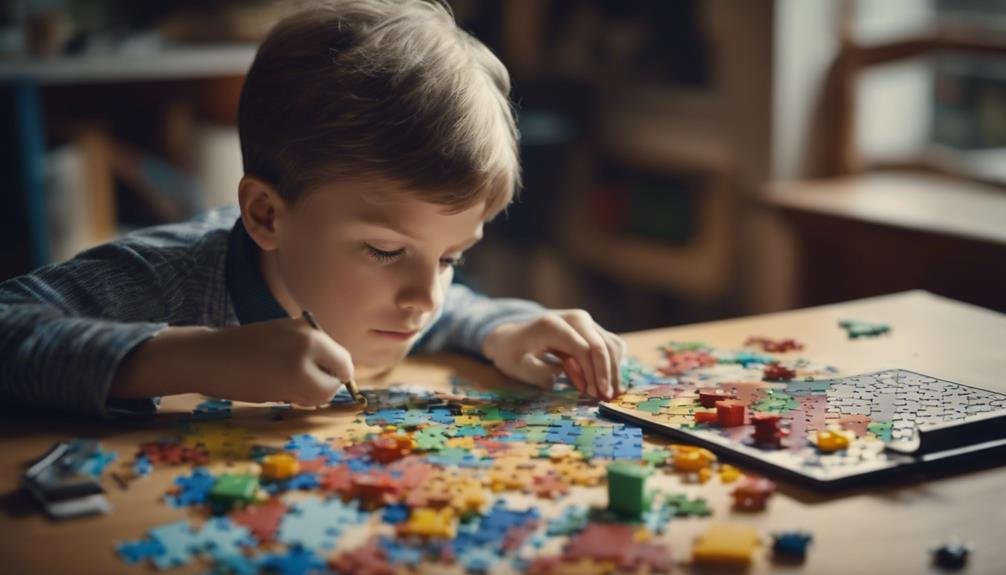"Cherishing Little Steps - A Haven for Baby and Family Journeys"
How to Develop Your Child's Critical Thinking Skills
Did you know that a study by the World Economic Forum ranked critical thinking as one of the top three skills that young people will need for the workplace of the future?
Cultivating these skills early on is vital for your child's future success. By fostering curiosity, engaging in problem-solving activities, and honing logical reasoning abilities, you can set a strong foundation for your child's critical thinking development.
But how can you effectively implement these strategies in your child's daily routine? Let's explore some practical tips to nurture these essential skills in your little one.
Key Takeaways
- Engage children in problem-solving activities to enhance critical thinking skills.
- Expose kids to logic puzzles and deductive games for analytical reasoning.
- Foster curiosity and inquiry to develop a habit of seeking answers.
- Encourage decision-making by weighing options and teaching structured approaches.
Importance of Critical Thinking Skills

Understanding the significance of developing critical thinking skills in children is fundamental for their academic success and future problem-solving abilities. Analytical thinking and creativity are essential components of critical thinking that allow children to approach problems from different angles, leading to more effective solutions. Research shows that fostering cognitive development and reasoning skills in children from a young age can have a lasting impact on their ability to navigate complex challenges later in life. By encouraging children to think critically, you're equipping them with the tools necessary to evaluate information, make informed decisions, and think independently.
Studies have demonstrated that children who engage in activities that promote critical thinking show improvements in their academic performance and overall cognitive abilities. These skills not only benefit academic success but also play an important role in shaping a child's future career prospects. By nurturing critical thinking skills early on, you're setting the stage for your child to excel academically and thrive in a rapidly evolving world that values innovation and problem-solving.
Encouraging Curiosity and Inquiry
To cultivate your child's critical thinking skills effectively, fostering curiosity and encouraging inquiry is paramount. When it comes to nurturing these skills, consider the following:
- Encourage Curiosity Exploration: Provide your child with opportunities to ask questions, explore new subjects, and investigate the world around them. Support their natural inclination to wonder and be inquisitive about different phenomena.
- Foster Inquiry Investigation: Help your child develop a habit of seeking answers through research, experimentation, and analysis. Encourage them to dig deeper into topics of interest, ask 'why' and 'how' questions, and find reliable sources to expand their knowledge.
- Model Curiosity and Inquiry: Demonstrate your own curiosity and willingness to investigate. Engage in discussions with your child, share your thought process when faced with a problem, and show them the value of continuous learning and seeking information.
Problem-Solving Activities for Kids

Engage your child in hands-on problem-solving activities that stimulate critical thinking and creativity. Creative challenges like building structures with limited resources or designing a new game from scratch can sharpen their problem-solving skills. Encouraging your child to tackle analytical puzzles such as Sudoku, logic riddles, or pattern recognition games can also enhance their ability to think critically.
Research indicates that children who regularly engage in problem-solving activities develop better reasoning skills and are more adept at thinking outside the box. These activities not only provide an avenue for intellectual growth but also foster resilience and perseverance in the face of challenges.
Developing Logical Reasoning Abilities
Encouraging your child to engage in activities that challenge their problem-solving skills can lay a strong foundation for developing logical reasoning abilities. By introducing logical puzzles and deductive games into your child's routine, you can enhance their critical thinking skills to a great extent.
Here are three key ways to promote the development of logical reasoning abilities:
- Solving Logical Puzzles: Regularly exposing your child to logic puzzles like Sudoku, riddles, or brain teasers can help them think analytically and enhance their ability to make reasoned judgments.
- Playing Deductive Games: Games such as chess, Mastermind, or even detective board games can improve your child's deductive reasoning by requiring them to make logical connections and infer conclusions based on available information.
- Encouraging Strategic Thinking: Engage your child in activities that involve strategic planning and decision-making, as these skills are closely linked to logical reasoning abilities and can help them approach problems systematically.
Cultivating Decision-Making Skills

How can parents guide their children in honing their decision-making skills effectively? Cultivating strong decision-making skills in children is important for their overall development. Encouraging analytical thinking from a young age can greatly benefit them in making rational choices as they grow.
One effective way to cultivate these skills is by involving children in problem-solving activities that require critical thinking and logical reasoning. For example, engaging them in age-appropriate puzzles or decision-making games can help enhance their ability to analyze situations and make sound judgments.
Additionally, parents can also encourage children to weigh the pros and cons of different options when making decisions. By teaching them to think about various perspectives and potential outcomes, parents can help children develop a structured approach to decision-making. Providing opportunities for children to make decisions independently, with guidance and support, can further enhance their confidence in their choices.
Ultimately, by fostering analytical thinking and encouraging rational choices, parents can play a significant role in helping children develop strong decision-making skills that will benefit them throughout their lives.
Frequently Asked Questions
What Role Do Emotions Play in Critical Thinking Development for Children?
Emotional intelligence greatly influences critical thinking development in children. By understanding and managing their emotions, kids can enhance problem-solving techniques. Encouraging an awareness of feelings fosters a well-rounded approach to analyzing and evaluating information.
How Can Parents Address Biases and Stereotypes in Their Child's Critical Thinking Skills?
To address biases and stereotypes in your child's critical thinking, you must cultivate cultural awareness. Just as a gardener tends to their plants, nurture your child's mind by uprooting biases and planting seeds of understanding.
Are There Any Specific Strategies for Fostering Creativity as a Component of Critical Thinking?
To foster creativity as part of critical thinking, engage in creative activities like art projects or storytelling. Encourage problem-solving techniques that promote divergent thinking. Incorporate imagination exercises to enhance your child's ability to think critically and creatively.
How Can Technology Be Used Effectively to Enhance Critical Thinking Skills in Children?
You think technology's just for fun, but digital tools challenge kids' minds. Interactive games spark problem solving, analysis skills. Embrace the screen for critical thinking growth. It's not all play; it's learning.
What Are the Potential Drawbacks or Challenges of Overemphasizing Critical Thinking in a Child's Development?
As you navigate the development of your child's critical thinking skills, it's essential to strike a balance. Overemphasizing can lead to tunnel vision, hindering creativity and emotional intelligence. Encourage a well-rounded approach for holistic growth.
Conclusion
To sum up, developing your child's critical thinking skills is essential for their future success. By encouraging curiosity and engaging in problem-solving activities, you can help them become independent thinkers who can navigate complex situations with confidence.
Cultivating decision-making abilities is equally important, as research shows that individuals with strong critical thinking skills are better equipped to analyze information, make informed decisions, and solve problems effectively.
Invest in your child's cognitive development today to set them up for a bright future.

